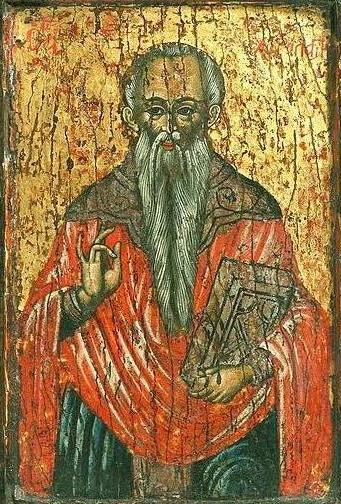“Truly, truly, I say to you, he who does not enter the sheepfold by the door but climbs in by another way, that man is a thief and a robber; but he who enters by the door is the shepherd of the sheep. To him the gatekeeper opens; the sheep hear his voice, and he calls his own sheep by name and leads them out. When he has brought out all his own, he goes before them, and the sheep follow him, for they know his voice. A stranger they will not follow, but they will flee from him, for they do not know the voice of strangers.” This figure Jesus used with them, but they did not understand what he was saying to them. So Jesus again said to them, “Truly, truly, I say to you, I am the door of the sheep. All who came before Me are thieves and robbers; but the sheep did not heed them. I am the door; if any one enters by Me, he will be saved, and will go in and out and find pasture.
John 10: 1-9 (Gospel on Feast of Sts. Constantine and Helen)
Christ is Risen!
Saints Constantine and Helen are two of the greatest saints in the Orthodox Church. In fact, they have been given the title “Equal-to-the-Apostles” for their witness of faith and contribution to the life of the Church. Saint Helen was the mother of Saint Constantine. Saint Constantine was the last emperor of the Roman Empire.
Constantine converted to Christianity during a battle when he was vastly outnumbered by an enemy force. In the sky he saw the vision of a cross with the words “en touto nika” “In this sign, you will be victorious.” Ordering his soldier to put crosses on their shields, he won the battle and became a Christian. In 313, through the Edict of Milan, he made Christianity the official religion of the Roman Empire. This was a turning point for Christianity, as for the first time, churches, Christians and Christianity were not being persecuted. In 325, St. Constantine moved the capital of the world from Rome to Turkey, to a city he renamed Constantinople. Thus ended the Roman Empire and began the Byzantine Empire, which stood from 325-1453. Saint Constantine also convened the First Ecumenical Council in Nicea in 325. This Council gave to us the Canon of Scripture (The Bible) as well as the Nicene Creed, our basic statement of faith. Saint Helen, Constantine’s mother, was a big influence on him and his introduction to Christianity. A saintly person in her own right, St. Helen organized a group of soldiers to go and find the true Cross of Christ, which they found buried on Golgotha.
Today’s Gospel is from John 10:1-9. Taken together with verses 9-16, they speak of Christ as the Good Shepherd, though this phrase “the Good Shepherd” is in verses 9-16. Jesus speaks in words that people of the time could understand, comparing Himself to a shepherd who cares for a flock of sheep, the people. He contrasts Himself to others who came before Him, claiming to be good shepherds of the sheep (the people of Israel) but were in fact more like robbers and thieves who didn’t care for the sheep.
Jesus said that the one “who does not enter the sheepfold by the door but climbs in by another way. . .is a thief and a robber.” (John 10:1) The one “who enters by the door is the shepherd of the sheep.” (10:2) The sheep hear the voice of their shepherd and follow the shepherd because “they know His voice.” (10:4) The people are confused, we are told, in verse 6. So, Jesus erases all doubt when He says to them “I am the door of the sheep. All who came before Me are thieves and robbers but the sheep did not heed them.” (10:7-8) Jesus concludes this passage by saying that He is the door by which we are to go in and out and find pasture. He is the door by which we will find our salvation. He is the door by which we will go out to the pasture to graze. And we will ultimately graze on Christ and on His word. If we want to find pasture, if we want to be fed and protected, Jesus is THE door (the one and only door) that makes this possible.
Jesus uses the image of the shepherd with the sheep because it is something people of that time understood. They understood that sheep need a shepherd to protect them, that the only place to be safe from wild animals was in the sheep pen, with a shepherd who would guard the door and keep them safe. Unlike sheep, however, who were not intelligent by nature and needed to be prodded and poked to move to safety, Jesus knows that we are rational sheep who need to be loved by the shepherd, and He presents Himself as the shepherd who loves the sheep and who would be willing to lay His life down for them.
The King of kings and God, who adorns the worthy with abundant gifts, caught you in His net, through the sign of the Cross, like He did to Paul the glorious, O Constantine. He said to you, “In this sign conquer your enemies.” Thus having sought Him, as did your godly-minded mother, and having found Him for whom you longed, you utterly defeated them. In company with your mother, earnestly pray for Orthodox rulers, and the Christ-loving armed forces, and all of us who loyally observe your memory, entreating Him who alone loves humanity, to deliver us from all wrath. (Doxastikon of Sts. Constantine and Helen, Trans. By Fr. Seraphim Dedes)
Saints Constantine and Helen were two disciples who provided “doors” by which Christianity was able to spread. Many people became sheep because of them!
